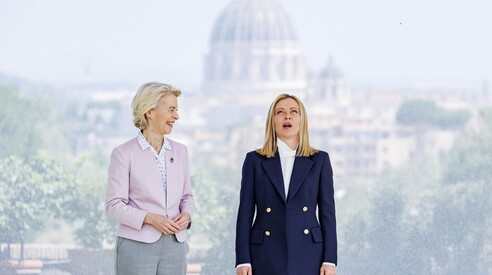On tariffs, Meloni to von der Leyen: "The EU will provide aid to businesses without affecting the NRRP." She's also seeking a coalition with Merz.


The case
A phone call between the Prime Minister and the President of the European Commission following the agreement with Trump. Italy is seeking to align itself with Germany. Giorgetti will speak in the Chamber of Deputies tomorrow. Opposition parties are united against the Prime Minister: "She sold out Italy to the US."
We must be wary of Matteo Salvini, but also of Emmanuel Macron. Both, albeit from very different perspectives, are critical of the outcome of the negotiations conducted and concluded by Ursula von der Leyen on tariffs. Domestic politics and European politics: these are the two fronts of Giorgia Meloni, who returned late last night from an African mission in Ethiopia. The prime minister calls the Scottish agreement, which is falling like a cold shower in Italy, "sustainable." She hopes to still prevail on the exemptions for agricultural products, saying she doesn't yet have all the data. For this reason, too, she isn't currently considering giving in to the opposition's demands for her to appear in the Chamber before the summer recess. Meanwhile, Economy Minister Giancarlo Giorgetti is expected in the Chamber tomorrow for question time. And this may be the first, and perhaps the only, moment of confrontation between the government and the opposition. Unless Meloni surprisingly decides to summon the minority leaders to Palazzo Chigi. That's currently a very remote possibility. (continued on page three) In this maze, Meloni appears to have found a way out, or so she says, in Germany. Evidence points to German Chancellor Friedrich Merz, who claims the agreement managed to avoid "a trade conflict that would have severely impacted the export-oriented German economy," particularly the automotive industry. Merz, in the heat of the moment, emphasized that Germany and the EU are fighting for "free and fair world trade" and that he will continue to support "the reduction of tariffs and trade barriers" even in negotiations on further free trade agreements, "particularly with the Mercosur countries in South America." Berlin's position of a decent agreement because it can avoid an escalation is also embraced and repeated, in less emphatic but essentially similar tones, by Rome. However, everything changes and wavers, as Merz corrects his position that evening and speaks of "substantial damage" to his country's economy. And here we see the difference in approach with Macron's France, who was critical of the negotiations' collapse from the early hours of Monday, with definitive words, especially directed at von der Leyen. This is the reaction of the main European governments, still shaken like the horses of the Palio di Siena by the US moves. Now the fun begins, so to speak. On the plane back home from Jimma, Meloni finally managed to speak to von der Leyen. It was the first telephone conversation between the Prime Minister and the Commission President since the latter's handshake with US President Donald Trump.
After having the details of this 15 percent explained, the Prime Minister once again demanded that Brussels grant European aid to companies affected by the tariffs, without, however, affecting the funds of the National Recovery and Resilience Plan (NRRP). To achieve this, however, the Commission must review the state aid mechanisms: this is Italy's request. On the web tax, however, Meloni's position is clear: the leader of the Brothers of Italy party is pushing for it to remain, but wants the European Commission to decide so. The ground is clearly undermined for the prime minister. Just read the barrage of opposition statements accusing her of capitulating to her friend Donald Trump. Indeed, tariff miracles—even Giuseppe Conte and Matteo Renzi are more than in line. The former prime minister and leader of Italia Viva says that "Meloni's bridge between Europe and America has collapsed" and that we are facing "an unconditional surrender of the EU to Trump's sovereignism." And here's the Five Star Movement leader describing the Prime Minister as a "standard-bearer of America first" to the detriment of "the present and future of Italians." The same sentiment is echoed by Democratic Party leader Elly Schlein, who emphasizes Italy's surrender and the defeat of nationalisms subservient to Trump. In short, the affair succeeds in uniting all opposition groups, including the AVS, without the usual distinctions. Fears of a united front are stirring at Via della Scrofa, the headquarters of the FdI, which, not surprisingly, chooses to respond only to Schlein with a flurry of statements about the "inconsistency and propaganda of the Democratic Party." Domestically, Meloni asks her allies to at least provide a semblance of unity after Sunday evening's joint statement. The effort is not easy because, in the end, Matteo Salvini defies the odds, defending the government and attacking Brussels and von der Leyen, demanding that she scrap the Green Deal. The Northern League also expressed impatience with Tajani's activism, as he quickly summoned businesses to the Farnesina to discuss support. "He's not the Minister of Economy," the League said. A corrective measure is currently ruled out, but funds are needed for companies affected by the tariffs.
More on these topics:
ilmanifesto





